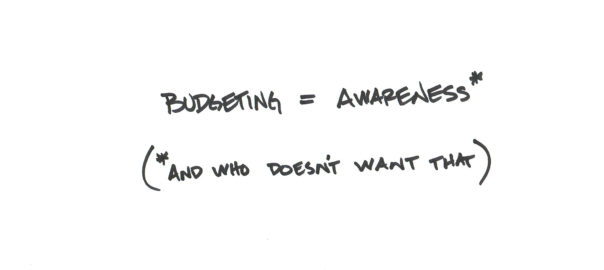This one is for all you yogis, meditators, and Buddhists out there. You want to achieve enlightenment? The key is not in down dogs and green smoothies. The key is budgeting.
I know that sounds crazy. But take it from Thich Nhat Hanh, “budgeting leads to enlightenment.”
I’m just kidding, Thich Nhan Hanh didn’t say that. But he did say, “Awareness is like the sun. When it shines on things, they are transformed.” As any good scholar of Buddhism knows, awareness is the key to enlightenment.
Well, what better way to become more self-aware than by budgeting? Seriously! Money creeps into almost everything we do in life. Being aware of our spending is one of the most powerful tools we have in becoming aware of ourselves. And really, that’s all budgeting is! It’s simply being aware of our spending.
I don’t run into too many people who love to budget. And when it comes to co-budgeting with a spouse or partner, there’s a good chance at least one of you will actually hate the idea.
Really, this is a marketing problem. You see, budgeting is a bit like flossing. We understand how important it is, but it’s not something most of us like to even think about, let alone actually do! So we lie to the dentist about how often we do it and promise to do better, only to skip it again the next day.
Anyone who takes the time to think about it would agree that spending money in a way that’s more aligned with our values will bring us more happiness. Of course, the only way to know if our spending is aligned with what we say is important is to track it. Tracking it will make us aware of how we’re spending our money, and then we’ll have the information to decide if we want to make changes.
So why aren’t we doing it?
1- It’s not fun.
True. But remember, as Stephen Covey says, “If the ladder is not leaning against the right wall, every step we take just gets us to the wrong place faster.” Budgeting is how we make sure our spending ladder is leaning against the right wall.
2- I already know where my money is going.
No, you don’t. Sorry. Unless you track your spending, you don’t have a clue where your money goes. Everyone I’ve ever seen go through the process of tracking spending for 30 days usually ends up saying some version of, “I had no idea I was spending that much on X.”
3- I’m not sure I want to know.
I think this is the biggest mental hurdle. The reality is that as we become aware of what and how we’re spending, we’ll find some things that surprise and bother us. Then we have to decide: Do we want to change?
Yes! Of course you want to change! Why else would you be contorting your body into weird shapes in a heated room with people chanting Om at you? Right? The whole point is to become more aware.
Just give it a shot. Try tracking your spending for 30 days. Don’t stress about what app to use. Just carry around a pen and a little notebook, and each time you make a purchase, write down what you spent and how it made you feel. At the end of the month, go back through your notebook and just notice. Become aware. That’s it.
What do you have to lose?
This article is written by ‘Carl Richards’ of behaviorgap.com. Carl is US based advisor, speaker and advisor for advisors.

